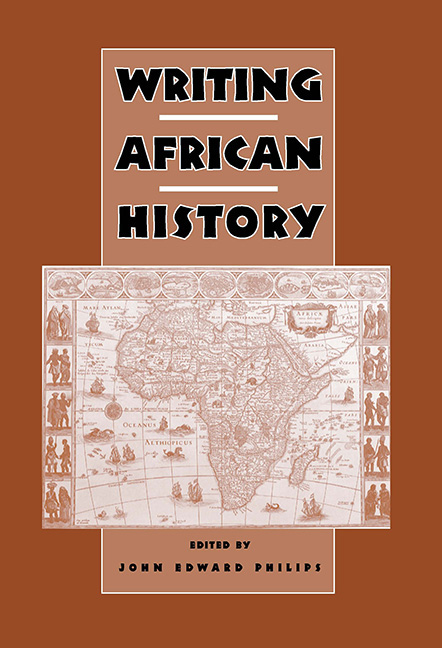Book contents
- Frontmatter
- Dedication
- Contents
- Acknowledgments
- Introduction
- Part I Background
- Part II Sources of Data
- Part III Perspectives on History
- 11 Data Collection and Interpretation in the Social History of Africa
- 12 African Economic History: Approaches to Research
- 13 Signs of Time, Shapes of Thought: The Contributions of Art History and Visual Culture to Historical Methods in Africa
- 14 Methodologies in Yorùbá Oral Historiography and Aesthetics
- 15 Local History in Post-Independent Africa
- 16 Africa and World-Systems Analysis: A Post-Nationalist Project?
- 17 “What Africa Has Given America”: African Continuities in the North American Diaspora
- 18 History and Memory
- 19 Writing About Women: Approaches to a Gendered Perspective in African History
- Part IV Conclusion
- Contributors
- Index
- Miscellaneous Endmatter
16 - Africa and World-Systems Analysis: A Post-Nationalist Project?
from Part III - Perspectives on History
Published online by Cambridge University Press: 11 May 2017
- Frontmatter
- Dedication
- Contents
- Acknowledgments
- Introduction
- Part I Background
- Part II Sources of Data
- Part III Perspectives on History
- 11 Data Collection and Interpretation in the Social History of Africa
- 12 African Economic History: Approaches to Research
- 13 Signs of Time, Shapes of Thought: The Contributions of Art History and Visual Culture to Historical Methods in Africa
- 14 Methodologies in Yorùbá Oral Historiography and Aesthetics
- 15 Local History in Post-Independent Africa
- 16 Africa and World-Systems Analysis: A Post-Nationalist Project?
- 17 “What Africa Has Given America”: African Continuities in the North American Diaspora
- 18 History and Memory
- 19 Writing About Women: Approaches to a Gendered Perspective in African History
- Part IV Conclusion
- Contributors
- Index
- Miscellaneous Endmatter
Summary
World-systems analysis, like the capitalist world-economy, has deep African roots. Most of the original formulators of the perspective, if not African, had considerable experience in Africa—and they openly acknowledged how this drove them towards a methodology suitable to understanding capitalism as a world-scale, historical system. And certainly no continent has been as integral to the development of capitalism, or suffered as much in the process, as Africa. Indeed, given five centuries of Africa's transcontinental role in capitalist development—from enslavement, through colonialism, to today's deadly embrace with free marketers—the study of Africa would seem a most fertile ground for world-systems work.
Yet despite this, world-systems analysis—or, more broadly, worldhistorical studies—has had only a small role in the study of continental Africa in the last twenty-five years. At the very moment when Africa appears increasingly vulnerable to world-economic forces, when “globalization” is on everyone's lips, substantive studies that place Africa within the capitalist world-economy are hard to find. Why this is so cannot be attributed solely to a general lack of world-historical studies of capitalism; here one need only look to Latin America, South Asia, or East Asia, where it is easy to point out a large world-historical literature that has developed over the last generation.
This presents a paradox to the writer confronted with evaluating work on Africa from a world-systems perspective: how does one account for the paucity of world-system studies of Africa, when Africa has been so important to the creation of the perspective and indeed of the capitalist world? Is a world-systemic understanding of Africa possible?
The answers lie only partly in examining the relevance and record of a world-systemic understanding of Africa's place in the modern world. Equally important, as we shall see, have been the shifting contours of how the study of Africa has been both understood and institutionalized in North America and on the continent. And this relates in turn to the critical impact, for African and world-systems studies alike, of epochal shifts in world power relations and, in particular, waves of African antisystemic movements.
These relationships among power in the interstate system, waves of African movements, and the conceptualization and institutionalization of studying Africa have rarely been addressed, particularly if one includes the relationship between North America and the continent.
- Type
- Chapter
- Information
- Writing African History , pp. 381 - 402Publisher: Boydell & BrewerPrint publication year: 2005

